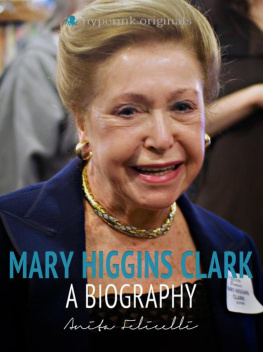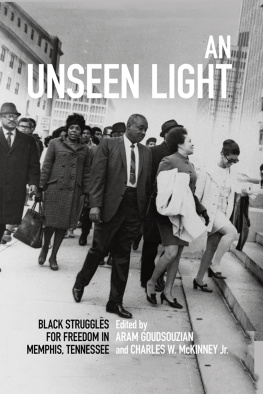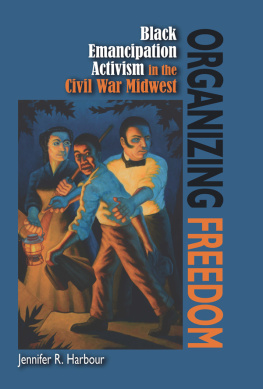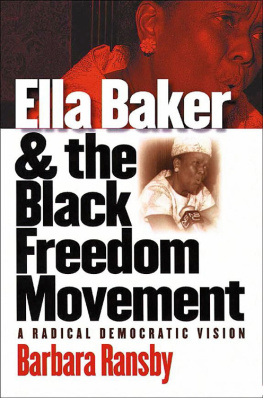This book was published with the assistance of the Center for the Study of the American South of the University of North Carolina at Chapel Hill.
The paper in this book meets the guidelines for permanence and durability of the Committee on Production Guidelines for Book Longevity of the Council on Library Resources.
The University of North Carolina Press has been a member of the Green Press Initiative since 2003.
Illustrations
Peter Porcher Poinsette, n.d.
Victoria Warren Anderson Poinsette, n.d.
Old Bethel United Methodist Church, Charleston, n.d.
Original Promise Land School, Johns Island, 195455
Septima Clark, Peter T. Poinsette, and Lucille Mears, mid-1920s
Nerie David Clark Jr. and Matilda Clark, 1926 or 1927
Nerie David Clark Jr., early 1930s
Lorene Poinsette, late 1920searly 1930s
Septima Clark in Maine, summer 1942
Clark family reunion, Hickory, N.C., n.d.
Faculty of Howard Elementary School, Columbia, 1945
Septima Clark at Hampton Institute, Hampton, Va., 1946
Septima Clark with members of Alpha Kappa Alpha sorority, ca. 1948
17 Henrietta Street, n.d.
Septima Clark, early 1950s
Esau Jenkinss bus, 1956
Alpha Kappa Alpha testimonial dinner for Septima Clark, December 3, 1956
Original Progressive Club, Johns Island, late 1950s
Two girls at a Citizenship School sewing class, Sea Islands, ca. 195859
Esau Jenkins and Myles Horton, 195859
Alleen Brewer and Citizenship School students, Edisto Island, ca. 195859
Septima Clark, ca. 195657
Myles Horton and Ella Baker at Highlander Folk School, 196061
Septima Clark and Bernice Robinson leading a teacher training session, ca. 1961
Citizenship School Training Workshop, ca. 196061
Citizenship School teacher trainees and staff, ca. 196061
Septima Clark, Dorothy Cotton, and Annell Ponder, Mississippi, 1963
Septima Clark and Andrew Young, 1970
Septima Clark with students from the University of California at Santa Cruz, early 1970s
Septima Clark and President Jimmy Carter, 1979
Acknowledgments
Of all the lessons I have learned in twelve years of working on this project, the realization that I cannot truly express my gratitude to all who have assisted me remains one of the most profound. I received research support from the John Perry Miller Fund and a John F. Enders grant at Yale University; the Institute for Southern Studies at the University of South Carolina; and the Carrie Chapman Catt Center for Women and Politics at Iowa State University. I am grateful to all the staff in the archives and libraries that I visited, without whom my research would have been much more difficult. I extend special thanks to Elaine Hall at the King Center; Joellen ElBashir at Howard University; Robin Copp and Herb Hartsook at the University of South Carolina; and to the South Carolina Historical Societys Karen Stokes and Jane Aldrich, who drove me around to many historical sites despite her busy schedule. Given that I practically lived at the Avery Research Center for the Study of African American History and Culture in the spring of 2002, I am indebted to everyone there. Sherman Pyatt was most helpful; Deborah Wright pulled numerous collections and did a lot of copying for me; Harlan Greene helped with photo permissions; and conversations with Curtis Franks have convinced me to join his church as soon as he opens it.
I met many new friends in the course of my travels. Frank and Margaret Adams entertained me in the Garden of the Good and Sardonic in Asheville, while Bill and Lorna Chafe gave me a place to stay in Chapel Hill. In Columbia, Dan and Val Littlefield graciously opened their home to me, as did Wim Roefs. After work in the archives all day, I enjoyed sharing a beer with Bobby Donaldson, Peter Lau, and Miles Richards. In Charleston, Emily Nixon and Stan Young offered me a room of my own. Miriam DeCosta-Willis kept in touch with supportive words, and talking politics with Jonathan Wale Cain kept me on my toes. To this day, whenever I see stunning ironwork, I think fondly of Jay Rice. Lois Simms invited me to a delicious lunch one afternoon. Joan Algar proved an indefatigable tour guide and an inspiration; she and her husband, John, have become cherished friends, as has Sophie Heltai, whose reflections on Septima Clark have meant the world to me. Cynthia Brown generously mailed her tape-recorded interviews with Clark to a stranger, and I am so delighted that I got to meet her in person. J. Herman Blake reminisced about Clark as he treated me to a scrumptious lunch in Ames, Iowa, and then insisted that I order dessert. Every person I interviewed passed on invaluable insight, and it is an honor to be entrusted with so many distinctive tales and tender memories. I offer special thanks to Clarks family, particularly to Elizabeth Poinsette-Fisher and Stephen Howard, who opened the family home place on Cannon Street so that Langhorne Howard could photograph the heirloom portraits of Clarks parents for this book.
A yearlong writing grant from the Spencer Foundation enabled me to complete the first draft of this project and introduced me to a magnificent cohort of fellows. I have to give a quick shout out to my fellow dancers on the rotating floor at the disco in Montreal: Andrew Ho, Lorena Llosa, Jordan Matsudaira, and Erendira Rueda. Karen Benjamin, Tina Collins, and Marc Van Overbeke, the only other historians in the bunch, read a chapter draft and offered astute suggestions, as did the members of my reading group at the Schlesinger Library 2007 Summer Seminar on Gender and Biography. I especially thank Nancy F. Cott, whom I had worked with in graduate school, and Benjamin Wise for their much-appreciated encouragement. Steve Dubb was another discerning reader, and Jane Dailey definitely made this a better book. The comments of scholars on conference panels, including Bill Chafe, Barbara Ransby, and Jacqueline Anne Rouse, enriched my efforts. In 20067, Amy Wood and I shared the honor of being the inaugural postdoctoral fellows at University of North Carolinas Center for the Study of the American South, where I met Harry Watson and Barb Call; they, along with Amy, shored me up at an unexpectedly difficult time. Thanks to Paul Betz at the University of North Carolina Press for all his patience. Though I met David Perry, my editor, in 1998, his benevolence through the years has only increased my affection for him. Then theres the Brazilian connection.









